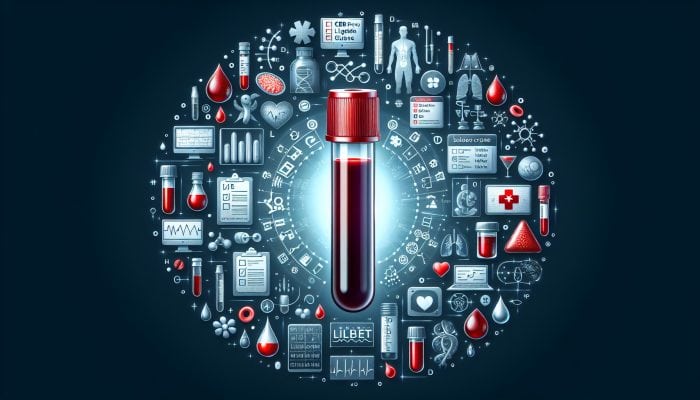Your Complete Resource for Understanding Well-Person Blood Tests
Understanding the Significance and Objectives of Well-Person Blood Tests

The Well-Person Blood Test in Ashington represents an essential aspect of preventive healthcare, meticulously evaluating numerous dimensions of your overall health via precise blood analysis. These tests go beyond being mere formalities; they are instrumental in detecting initial signs of illness, assessing comprehensive wellness, and yielding significant information about your body's functionality. A standard well-person blood test typically includes various general assessments such as:
- Complete Blood Count (CBC)
- Lipid Profile
- Blood Glucose Test
- Liver Function Tests
- Thyroid Function Tests
- Kidney Function Tests
- Vitamin D Levels
- Electrolyte Panel
The true value of these tests lies in their ability to reveal hidden health issues that might otherwise go unnoticed. By thoroughly examining the various elements found in your blood, medical professionals can create a detailed and holistic picture of your health status.
The Crucial Role of Regular Health Screenings in Your Overall Well-Being
Participating in consistent health screenings, especially well-person blood tests, is fundamentally vital for the prompt identification of potential health concerns. These proactive health measures allow for timely interventions, dramatically improving health outcomes and potentially saving lives. By prioritising health management through these tests, individuals can aim for sustained health and vitality. For example, discovering high cholesterol levels early on can inspire lifestyle adjustments or medical treatments that significantly reduce future risks of heart disease. Ultimately, routine screenings empower individuals to take control of their personal health journeys.
Effective Strategies for Preparing for Your Blood Test
Proper preparation for a well-person blood test is essential to guarantee that the results are both accurate and trustworthy. Depending on the specific tests requested, you may need to fast for a duration of 8 to 12 hours prior to the test. It is also vital to refrain from taking certain medications that could potentially alter the test results; always consult your healthcare provider regarding any medications you are currently taking. Additionally, staying well-hydrated is equally crucial, as it can ease the blood draw process. Following the specific instructions given by your healthcare provider is imperative for achieving the best possible outcomes.
Insights from Experts on the Importance of Well-Person Blood Tests in Ashington

Healthcare Professionals' Views on the Importance of Well-Person Blood Tests
Medical professionals fervently advocate for the consistent utilisation of well-person blood tests, as they provide an extensive examination of an individual’s health profile. Numerous healthcare experts highlight that these tests can be pivotal for early diagnosis, which often leads to significant improvements in patient outcomes. For instance, recognising elevated blood sugar levels during a routine assessment can prompt timely interventions for diabetes management, thereby substantially enhancing the patient's quality of life. Countless real-life examples illustrate how early detection has halted the advancement of serious diseases, underscoring the critical role these evaluations play in preventive healthcare.
Enhancing Your Health Management with Well-Person Blood Tests
Well-person blood tests take a proactive approach to health management by identifying potential health concerns before they evolve into noticeable symptoms. This early detection empowers healthcare providers to initiate preventive strategies, including lifestyle changes or targeted treatments. For instance, if a blood test indicates thyroid dysfunction, timely medical interventions can be implemented to prevent further complications. Furthermore, these tests are vital for monitoring the effectiveness of ongoing treatments for pre-existing health conditions, ensuring that patients receive the most appropriate care tailored to their unique health profiles.
Understanding Your Blood Test Results: What to Expect

The results of a well-person blood test can provide critical insights into various health indicators, including cholesterol levels, blood sugar, kidney function, and liver enzymes. Understanding these results is vital for making informed health decisions. For example, if your cholesterol levels are identified as elevated, your healthcare provider may recommend dietary changes or medications. It is crucial to discuss these findings with your healthcare provider, who can clarify what they mean in relation to your overall health and suggest any necessary follow-up actions.
Finding Well-Person Blood Testing Services in Ashington
Explore Local Clinics Offering Comprehensive Blood Testing
In Ashington, several clinics provide well-person blood tests, ensuring that the local community has access to essential health screenings. Selecting a reputable clinic staffed by experienced professionals is crucial for obtaining accurate and reliable results. Some of the leading clinics in Ashington for blood testing include:
- Ashington Health Centre
- Northumberland Medical Group
- Boots Pharmacy Health Clinic
- Well Pharmacy
- Simply Health Clinic
- Vitality Health and Wellness
Each of these clinics is esteemed for its dedication to patient care, offering a broad array of comprehensive testing options, making them excellent choices for individuals in need of blood tests.
Understanding the Financial Aspects of Blood Tests in Ashington
The cost associated with a well-person blood test in Ashington can vary significantly based on the policies of the clinic and the extent of the tests performed. Some clinics may offer package deals that can be more economical than ordering tests individually. On average, you might expect to spend between £50 and £150, depending on the specific tests included. It is advisable to consult with the clinic regarding detailed pricing and any potential discounts, especially for those seeking multiple tests simultaneously.
How to Schedule Your Blood Test Appointment Effortlessly
Arranging a well-person blood test in Ashington is a straightforward process. Most clinics feature user-friendly online booking systems that allow you to conveniently schedule your appointment. Some clinics might require a referral from your GP, so it’s essential to confirm this before attempting to book your test. Always verify the availability of the specific tests you need and any preparation instructions to ensure you are fully prepared on the day of your appointment.
The Long-Term Benefits of Regular Well-Person Blood Tests
Identifying Key Advantages of Routine Blood Tests
Regular well-person blood tests provide a multitude of benefits, such as early disease detection, monitoring existing health conditions, and facilitating comprehensive health management. Engaging in these screenings can offer peace of mind, empowering individuals to adopt a proactive approach towards their health. Routine testing allows healthcare providers to detect anomalies early, leading to more effective treatment strategies. Additionally, these tests encourage patients to embrace healthier lifestyles by presenting tangible health metrics to consider.
Preventing Serious Health Conditions Through Proactive Testing
By identifying health risks at an early stage, well-person blood tests can significantly contribute to the prevention of serious health issues such as heart disease, diabetes, and various forms of cancer. Early intervention is crucial for improving health outcomes, as it allows for timely lifestyle changes, medications, or other treatments to be initiated before conditions deteriorate. For instance, regular monitoring of cholesterol and blood pressure can greatly reduce the risk of cardiovascular incidents, emphasising the importance of proactive health measures.
Improving Quality of Life Through Continuous Health Monitoring
Regular health monitoring via well-person blood tests can lead to a substantially enhanced quality of life. By tracking vital health indicators, individuals can make informed lifestyle changes and seek timely medical advice when necessary. For example, if a test indicates elevated blood sugar levels, the individual can proactively implement dietary adjustments and increase physical activity to manage their levels effectively. This empowerment not only improves physical health but also positively impacts mental well-being, enabling individuals to feel more in control of their health journey.
The Role of Well-Person Blood Tests in Personalised Medicine
Well-person blood tests generate valuable data that can be used to tailor medical treatments to meet individual needs, thereby increasing the effectiveness of interventions. Personalised medicine focuses on leveraging a patient’s unique genetic, lifestyle, and environmental factors to create customised treatment plans. Blood tests can uncover specific markers that inform healthcare providers about the most effective treatments or lifestyle modifications for that individual, ensuring a more targeted approach to health management.
Implications of Well-Person Blood Tests on Health Insurance and Employment Opportunities
Regular well-person blood tests can have significant implications for health insurance premiums and employment prospects. Many health insurance providers consider the frequency of health screenings when setting premiums; individuals who consistently engage in regular testing often enjoy more favourable rates. Moreover, demonstrating a commitment to health through these tests can positively influence potential employers by showcasing responsibility and a proactive approach to wellness — qualities increasingly valued in today’s workplace.
Research-Supported Benefits of Well-Person Blood Tests in Ashington
Current Research Findings on Well-Person Blood Tests
Research consistently indicates that well-person blood tests can notably enhance health outcomes by enabling early detection and management of various conditions. Studies suggest that individuals who engage in regular testing typically enjoy better long-term health compared to those who do not. To effectively interpret research data, consider actionable steps such as seeking studies published in reputable medical journals, focusing on sample sizes and demographics relevant to your health profile, and discussing findings with your healthcare provider for contextual understanding.
Influence of Well-Person Blood Tests on Public Health Initiatives
Well-person blood tests play an integral role in public health initiatives by facilitating the early diagnosis and treatment of diseases. This proactive stance helps to alleviate the overall burden on healthcare systems, as undiagnosed conditions can escalate into more severe health complications that require extensive resources to manage. By promoting awareness and accessibility of blood tests, public health campaigns can encourage increased participation in screenings, ultimately improving community health outcomes.
Long-Term Health Benefits Associated with Routine Blood Testing
The long-term health benefits derived from well-person blood tests include a reduced risk of chronic diseases, improved life expectancy, and enhanced overall health management. Regular screenings form the cornerstone of preventive medicine, empowering individuals to maintain optimal health and avert complications associated with untreated conditions. Continuous health management can be elevated through ongoing monitoring, ensuring that any changes in health status are promptly addressed.
How Residents of Ashington Can Access Well-Person Blood Tests
Residents of Ashington can access well-person blood tests through a variety of local healthcare providers, private clinics, and community health programmes. The availability of these services is extensive, ensuring that individuals can easily find options that cater to their needs. Many NHS services also cover certain blood tests, enhancing accessibility for those who may have financial constraints. Engaging with local health initiatives can further improve access to these vital screenings.
Understanding Costs and Insurance Coverage for Well-Person Blood Tests
The costs associated with well-person blood tests can differ, with many being covered by NHS services or private health insurance plans. This coverage renders these essential tests accessible to a diverse range of individuals in Ashington. Patients should consult their insurance providers to clarify specific coverage details and any potential out-of-pocket expenses that may arise. Additionally, certain clinics offer payment plans or discounts for upfront payments, making testing more financially manageable.
Decoding Your Blood Test Results: An In-Depth Guide
How to Accurately Interpret Your Blood Test Results
Understanding your blood test results involves comprehending the normal ranges for various health markers and the implications of any deviations from those ranges. Normal ranges may fluctuate based on factors such as age, sex, and other variables, making it essential to discuss your results with your healthcare provider. Key blood markers commonly evaluated include:
- Haemoglobin — Indicates oxygen transport capability
- Glucose — Reflects blood sugar levels
- Cholesterol — Assesses cardiovascular health
- Creatinine — Evaluates kidney function
- ALT/AST — Indicates liver health
- Thyroid Hormones — Assesses thyroid function
Each of these markers provides critical insights into your overall health, and any deviations can prompt further inquiry or necessary action.
What Different Blood Markers Reveal About Your Health Status
Various blood markers can signify different aspects of your health condition. For example, elevated liver enzymes (ALT and AST) may indicate liver inflammation or damage, while high glucose levels could suggest diabetes or prediabetes. Understanding the implications of each marker is crucial for accurately interpreting your results. Additionally, cholesterol levels are vital for assessing cardiovascular risk, while kidney function markers like creatinine can inform you about renal health status. Collaborating with a healthcare provider to decode these markers can lead to informed health decisions.
When to Follow Up on Your Blood Test Results
Following up on your blood test results is imperative, especially if any markers fall outside the normal range. Your healthcare provider will inform you about the appropriate timing and nature of follow-up required based on your results. For instance, if a test indicates elevated cholesterol levels, your provider may recommend additional tests or lifestyle modifications within a specified timeframe. Regular follow-up ensures that any potential health issues are managed proactively, significantly reducing the risk of complications.
Choosing the Right Clinic for Your Blood Test in Ashington
Key Factors to Consider When Selecting a Clinic
Choosing a clinic for your well-person blood test necessitates careful consideration of various factors, including reputation, cost, convenience, and the comprehensiveness of the tests offered. It is essential to feel comfortable and confident in your choice. Verifying the clinic's accreditation and certifications can offer valuable insight into the quality of service provided. Additionally, evaluating the availability of experienced staff and the range of tests available can greatly influence your overall experience and the accuracy of the results.
How to Assess the Quality of a Clinic
Assessing the quality of a clinic involves examining patient reviews, clinic accreditation, and the expertise of the medical staff. High-quality clinics often exhibit transparent processes and receive positive feedback from patients. Look for testimonials that highlight patient experiences, particularly regarding the professionalism of the phlebotomists and the clarity of the results provided. A reputable clinic prioritises patient comfort and fosters a supportive environment conducive to effective health screenings.
Services You Should Expect from a Quality Clinic
When selecting a clinic for a well-person blood test, consider those that provide a comprehensive range of tests, employ skilled phlebotomists, and offer clear, comprehensible results. Some clinics may also provide additional health services, such as nutritional counselling or chronic disease management, which can be beneficial for holistic health monitoring. The availability of online results and easy access to healthcare professionals for follow-up questions are additional advantages to consider.
Essential Steps for Preparing for Your Well-Person Blood Test
Necessary Preparations Before Your Blood Test
Prior to your well-person blood test, it is crucial to adhere to any fasting instructions provided by your healthcare provider, which may involve abstaining from food or drink for a stipulated period. Additionally, be mindful of any medications you are currently taking, as some may need to be paused temporarily. Staying well-hydrated can facilitate the blood draw process, so ensure you consume plenty of water unless directed otherwise. Confirm any specific preparation requirements with your clinic ahead of your appointment to avoid any last-minute complications.
Effective Techniques for Managing Pre-Test Anxiety
Experiencing anxiety before a blood test is quite common; however, there are strategies to effectively manage this anxiety. Deep breathing exercises can help calm your nerves, while concentrating on the positive aspects of undergoing the test can also be beneficial. Distraction techniques, such as listening to music or engaging in conversation with the phlebotomist, can alleviate feelings of anxiety. Mentally preparing yourself by understanding the procedure and what to expect can empower you, reducing fear and promoting a more relaxed mindset.
Important Items to Bring to Your Blood Test Appointment
When attending your appointment for a well-person blood test, it is essential to bring your identification, any referral forms that may be necessary, and a list of medications you are currently taking. Some clinics may also require payment or insurance information at the time of the test, so ensure that you have these details readily available. Being organised with all necessary documents can streamline the process, ensuring that everything runs smoothly and allowing you to focus on your health rather than logistical matters.
What to Expect During Your Blood Test Procedure
During your blood test, a qualified phlebotomist will draw blood from a vein, typically located in your arm. The entire process is quick and generally involves a slight pinch or pressure sensation. Following the blood collection, a small bandage will be applied to the site. Expect the entire procedure to take just a few minutes. Knowing what to expect can help alleviate any anxiety you may have about the process, contributing to a more comfortable experience.
Next Steps and Follow-Up Actions After Your Blood Test
What Actions to Take After Receiving Your Blood Test Results
Once you receive your blood test results, it is essential to discuss them with your healthcare provider to understand any necessary follow-up actions or lifestyle changes that may be required. This dialogue ensures that you are comprehensively informed about your health status and the implications of the results. Your provider can assist in interpreting what the numbers signify and guide you toward appropriate next steps, whether that involves further testing or adjustments in your health habits.
How Often Should You Schedule a Well-Person Blood Test?
The frequency at which you should have a well-person blood test can vary based on factors such as age, health status, and family history. Generally, adults are advised to undergo screening at least once a year; however, your healthcare provider can offer tailored recommendations based on your individual health profile. For instance, individuals with a family history of specific conditions may require more frequent screenings to ensure timely detection.
What to Do if Abnormalities Appear in Your Test Results
If your blood test results indicate abnormalities, your healthcare provider may recommend further testing to clarify the findings. They may also suggest lifestyle changes or treatment options contingent on the nature of the abnormalities. It is crucial to adhere closely to their guidance to manage your health effectively. Taking prompt action can avert potential health issues and enhance your overall well-being.
Preparing for Future Blood Tests: Essential Considerations
To ensure accurate results for future blood tests, it is vital to follow your healthcare provider’s instructions regarding fasting, medication adjustments, and other preparatory measures. Proper preparation is key to obtaining reliable outcomes. Staying informed about the specific requirements for each test can help avoid unnecessary complications or inaccuracies in your results, ultimately supporting your health management journey.
Potential Lifestyle Changes Your Healthcare Provider Might Recommend
Based on the outcomes of your blood test, your healthcare provider may suggest various lifestyle changes designed to enhance your health. These recommendations could encompass dietary modifications, increased levels of physical activity, or stress management techniques. Implementing these changes is essential for preventing future health issues and optimising your overall well-being. Tailored advice can empower you to make informed choices that align with your health goals.
Frequently Asked Questions (FAQs) Regarding Well-Person Blood Tests
What Is the Purpose of a Well-Person Blood Test?
A well-person blood test serves as a comprehensive health screening designed to analyse various health markers, assessing overall wellness and identifying early signs of potential diseases.
How Often Should I Schedule a Well-Person Blood Test?
It is generally advisable to have a well-person blood test at least annually; however, your healthcare provider may recommend more frequent testing based on your individual health circumstances.
What Can I Expect During the Blood Test Procedure?
During a blood test, a qualified phlebotomist will collect a sample of blood from your vein, usually in your arm. The process is quick, and you may feel a slight pinch during the draw.
What Preparations Are Required for a Blood Test?
Preparation may involve fasting for a specific period, avoiding certain medications, and ensuring adequate hydration. Always adhere to your healthcare provider’s specific instructions regarding preparation.
What Steps Should I Follow if My Test Results Are Abnormal?
If your test results are abnormal, your healthcare provider will recommend further testing or treatment options. It’s crucial to discuss these results thoroughly to understand the next steps.
Is Insurance Usually Accepted for Well-Person Blood Tests?
Many well-person blood tests are covered by NHS services or private health insurance plans, making them accessible to a wide range of individuals.
Which Common Tests Are Typically Included in a Well-Person Blood Test?
Common tests may include a Complete Blood Count (CBC), lipid profile, blood glucose test, liver function tests, and thyroid function tests.
How Can I Find a Clinic for Blood Testing in Ashington?
You can locate clinics in Ashington by searching online for local healthcare providers or community health centres that offer blood testing services.
What Is the Average Wait Time for Blood Test Results?
Generally, blood test results can take anywhere from a few days to a week to be processed and returned, depending on the clinic and the specific tests conducted.
Am I Allowed to Eat Before My Blood Test?
Whether you can eat before your blood test depends on the specific tests being performed. Some tests require fasting, while others do not. Always confirm with your healthcare provider.


